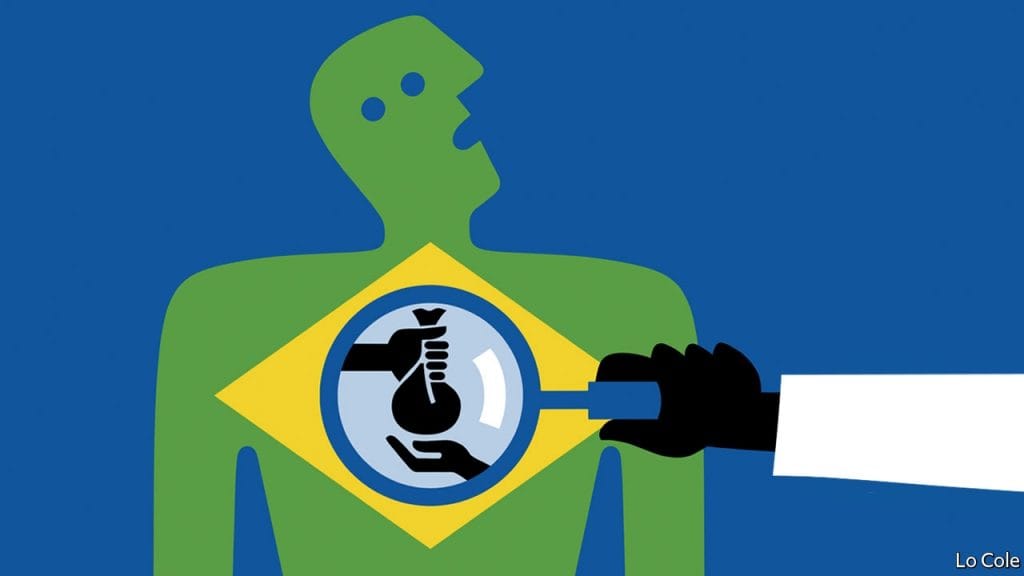
The conviction of Lula and the future of Brazil’s political purge
 Why the Lava Jato corruption investigations must continue
Why the Lava Jato corruption investigations must continue
ALMOST three-and-a-half years after it began as a seemingly routine probe into money-laundering, Operation Lava Jato (“Car Wash”) has reached a critical stage. On July 12th Sérgio Moro, a federal judge, sentenced Luiz Inácio Lula da Silva, a former president, to almost ten years in prison, ruling that he was given an apartment worth 2.2m reais ($690,000) by a construction firm that had received padded contracts for work on an oil refinery. Congress this week began debating whether to allow a trial of the current (centre-right) president, Michel Temer, who is charged with benefiting from a bribe of $150,000, which he denies.
With the political establishment mortally threatened, calls for the corruption probes to be reined in have mounted. Lula’s lawyers say he is the innocent victim of “a politically motivated investigation”. He will remain free while he appeals, but the sentencing makes it harder for him to run for president again in 2018. It will also intensify debate as to whether Lava Jato is an overdue holding to account of the powerful, or just a witch-hunt.
It has spread far beyond the cartel of construction companies that obtained unduly generous contracts from Petrobras, the state-controlled oil company, by bribing officials and politicians. A recent focus was JBS, the world’s biggest meat company, whose bosses, Joesley and Wesley Batista, admitted paying bribes totalling $185m to hundreds of politicians. It was Joesley Batista who implicated Mr Temer by secretly taping a meeting at which he invited the president into indiscretion; one of his managers gave cash to an associate of Mr Temer, the source of the bribery charge.
In all 157 people have been convicted so far. The supreme court has authorised the prosecutors to investigate scores of members of congress. To get this far, the prosecutors have relied on techniques that are novelties in Brazil. By using “preventive detention” and plea bargaining, they have extracted confessions and evidence that have led to charges against some of the country’s most prominent businessmen and politicians.
Their critics see in all this a kind of Jacobinism in which the presumption of innocence is forfeited and the objective is not so much to apply the law as to undertake a crusade to rid Brazil of its political class. They also argue that Lava Jato’s never-ending probes are depriving the country of the political stability it desperately needs.
They have a point. Rodrigo Janot, the attorney-general, has been widely criticised for his plea bargain with the Batistas, which broke good practice by granting them immunity from prosecution (rather than a reduced sentence). The police have not yet been able to corroborate many accusations against politicians made in plea bargains by managers of Odebrecht, a construction company. Selective leaking of accusations destroys reputations even if innocence is later confirmed. Those who received undeclared campaign donations—a crime, but the norm—are lumped together in the public mind with those who took huge bribes.
All that said, Lava Jato has revealed and punished widespread wrongdoing. It has ended a long-standing practice in Brazil of failing to punish white-collar crime, thereby propagating it. As Deltan Dallagnol, the lead prosecutor in Lava Jato, has written in a new book, his small team is up against the best-connected and most expensive law firms in the country. The prosecutors (and Mr Moro) have been subject to close judicial oversight, including from the supreme court.
Much of the criticism is self-interested. Now it is the right, as well as Lula’s left-wing Workers’ Party, that is complaining. If Mr Temer has indeed committed a crime, any stability he offers is false, or carries an unacceptable price. That is why attempts to curb the investigations, if they succeed, would be alarming. Congress has debated—but not yet approved—a bill that would punish judges and prosecutors for “abuses”. This month the federal police merged its dedicated Lava Jato task force into a broader anti-corruption unit. That has raised fears that Lava Jato could be wound down. But since there are now so many more targets, it is not necessarily suspicious.
There is another reason to carry on: if the probe stopped now, Lula would be right to cry bias. Public opinion remains firmly behind Lava Jato. That is why efforts to scotch it are unlikely to succeed. Mr Temer is a skilled parliamentarian. But his support in congress is fraying. He may not be able to rally the 172 votes, of 513 in the lower house, he needs to avoid being tried. Many Brazilians see the chance of a better country emerging from the investigations. In that, they are surely right.